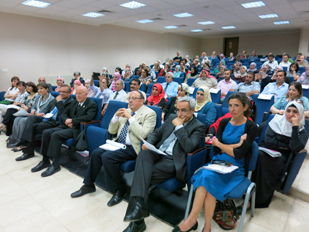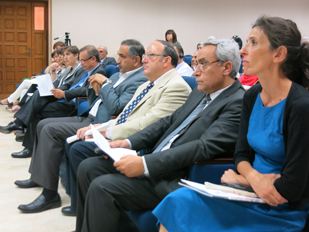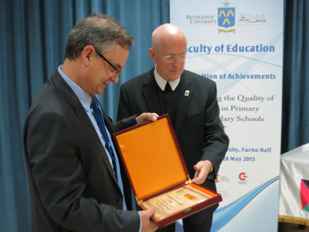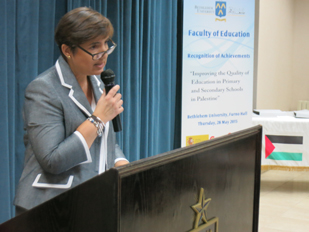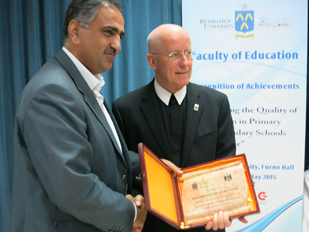Last May 28th, the closing ceremony of the Education Agreement, which has been funded by the AECID and implemented by the Bethlehem University, took place. The total budget of 3.5 million Euros for four years has been coordinated by the FPSC office in Jerusalem, which resulted in a relevant improvement of the technological capacities and the methodology of the primary and secondary education teachers in the public schools in the south of the West Bank.
During the ceremony, the study “Evaluation of Special Education Services Offered to Pupils with Learning Difficulties in Regular Schools in Palestine” was presented, which is co-directed by Sair Dukmak, Associate Professor at the Al Ain University of Science and Technology in the United Arab Emirates and Rizek Sleibi, ex Dean of the Faculty of Education in the Bethlehem University and coordinator of the Agreement.
The Assistant Deputy Minister of Education in Palestine, Basri Saleh; the Vice Chancellor of the Bethlehem University, Dr. Peter Bray; the Spanish Consul in Jerusalem, Juan José Escobar; the Acting Coordinator of the Cooperation Office of the AECID in Jerusalem, Eva Suárez; and the Project Director of the FPSC, Macarena Cotelo, participated in the event.
During his speech, the Spanish Consul Juan José Escobar highlighted the role Spain played in the task of “supporting education, not only by building new schools and classrooms, or by fixing those already built among the West Bank and the Gaza Strip, but also by helping to improve the educational standards through better technological and human capacities of the main agents of the education sector”. Furthermore, the Consul emphasized the importance of education in Palestine as a catalyst “of values such as gender equality, respect for human rights, inclusion of the minorities and cultural diversity”.
As for the Project Director of the FPSC, Macarena Cotelo, she stressed the great relevance of education as a fundamental human right, especially in a country with an extremely young population pyramid, which definitely needs to invest on the training of human rights if the target is to become a competitive economy and to have a joint society. “The FPSC, from its starts in Palestine, with a small educational project carried out in the school of the Latin patriarchate in Bir Zeit, has always showed a special interest for education”, she pointed out, referring to what has been declared as an exit sector by the AECID in Palestine, but to which the FPSC will still be committed in cooperation with other donors.
Brother Peter Bray, on the other hand, highlighted the relevance of investing in education “to keep the hope in Palestine and to create opportunities, especially for young people”. For this reason, he made a call to keep improving the quality of education. “It is about a win-win situation: we all win”, he added, as he thanked Spain for the continuous investment during these years in the Palestinian educational sector.
To sum up, the Assistant Deputy Minister of Education, Basri Saleh, was delighted to see Palestine in such a good place in a recent report published by the UNESCO on the status of education in the Middle East. “This makes us competitive not only at a local and regional level, but also at an international level”, he stressed, and added that “we need to improve even more the skills and abilities of our young people, thanks at the same time to the improvement of the skills of our teachers in togetherness with the national educational strategy”.





